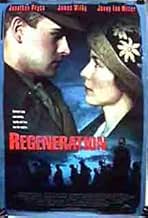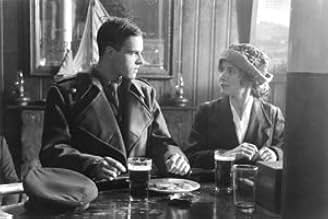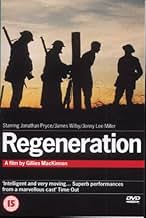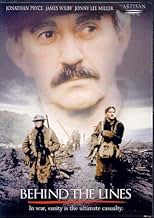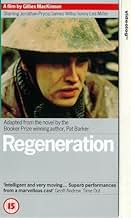Ajouter une intrigue dans votre langueBased on Pat Barker's novel of the same name, "Regeneration" tells the story of soldiers of World War One sent to an asylum for emotional troubles. Two of those soldiers are England's most i... Tout lireBased on Pat Barker's novel of the same name, "Regeneration" tells the story of soldiers of World War One sent to an asylum for emotional troubles. Two of those soldiers are England's most important WW1 poets.Based on Pat Barker's novel of the same name, "Regeneration" tells the story of soldiers of World War One sent to an asylum for emotional troubles. Two of those soldiers are England's most important WW1 poets.
- Nominé pour le prix 1 BAFTA Award
- 17 nominations au total
Avis en vedette
Taking a rather different approach from the 'war-is-hell' mass-entertainment spectacle of Spielberg's recent 'Saving Private Ryan' and Terence Malick's elliptical 'The Thin Red Line' (both made in 1998), 'Regeneration' evades easy solutions and focuses on the psychological horrors of war in a more low-key and balanced manner. The horrific battle scenes are largely eluded to in flashback, invoked during the well-meaning Pryce's therapy sessions, which utilise the entire arsenal of early Freudian psychotherapy, from dream-analysis to hypnotism as well as more quirky techniques such as putting shell-shocked officers in charge of troops of boy scouts in order to help them regain confidence in their leadership abilities. The central perplexity here is that the soldiers are being cured with the intention of sending them straight back to the front line.
With this and his following film, 'Hideous Kinky', Gillies MacKinnon is emerging as one of the most thought-provoking and technically accomplished British directors working at the moment, adopting an expressionistic cinematic style here which utilises the dark forbidding milieu of the hospital and the surrounding bleak, autumnal countryside to full claustrophobic effect. There are problems here, in the way that the script concentrates on a number of patients, including an angst-ridden Jonny Lee Miller (in his first post-Trainspotting role) who begins the film mute, without fully exploring the relationships between them, but it successfully establishes itself within a convincing historical context whilst challenging the proposition that Britain was united in its conviction to the First World War (of particular relevance today, given our involvement in the bombings of Kosovo and Iraq). Whilst not immediately accessible, it is a film that demands and rewards the closest of attention, and bodes well for future films from the director. Based on the 'Regeneration' trilogy of novels by Pat Barker.
"Regeneration" is different. It is not with graphically real blood spilled, but rather with powerfully wrenching emotion and with poetry that this film drives home what war does to the men (and women) caught up in its sweep. The film's use of the poems of Siegfried Sassoon and Wilfred Owen is stunning, and while perhaps even more of their incredible poetry could have been employed in the film, the ones the filmmaker employs are carefully and perfectly chosen.
This is a war movie because its focus is on the war's destruction of men. But do not go into this film expecting the action of the battlefield to play out on the screen. There are a few scenes from the fields of France, powerful and well-placed in the film. And throughout the movie, you can just hear the dull thudding of shells, as if from a great distance - a striking reminder of how physical distance does not mean emotional distance. But if you are interested in the emotional impact those shells had, in an examination of the struggle to recover from that impact, (through poetry, through love, and through therapy), and in the moral questions raised by war, this is a stunning, deeply moving film you will not soon forget.
The drama is based on real events, and the performances are quite stunning. Above all, Jonathan Pryce as Dr. Rivers is simply incredible, a man torn between duty and compassion, a doctor on the verge of becoming a patient himself. In a just world, he would have won an Oscar (but hardly anyone, it seems, saw this film on initial release). The handsome James Wilby gives a very fine performance as Sassoon--in fact, I've never seen him in better form. Johnny Lee Miller perfectly embodies the edgy anger, angst, and shame of Billy Prior. And Stuart Bunce brings a remarkably gentle, otherworldly quality to his haunting portrayal of Wilfred Owen. You absolutely believe that this man has a poet's soul; but he finds his voice not by contemplating beauty but by contemplating supreme horror.
There are many scenes from this film I will never forget--particularly, Dr. Rivers' trip to see another doctor cure a patient of being mute by applying electricity directly to his teeth and larynx. This scene is horrifying and, yet, like the rest of the film, restrained, in part because of the way Pryce portrays Rivers' reactions. Another unforgettable scene is the abrupt, shattering ending--but I won't give that away. Suffice it to say that words, especially the words of a great poet, sometimes are more powerful than shocking images.
This is a very intelligent, moving, humane, and important film. What a shame that it has been so overlooked.
Regeneration is a thoughtful anti-war film where the paradox of war is implied in a Scottish hospital for the treatment of shell shocked officers. The doctor has to get them well so they can be returned to the front lines, where they will more than likely be killed. The script is intelligent and the acting is superb. There are some allegorical scenes which do more to underscore the pigheaded arrogant mentality of the "establishment" which continued a war until quite simply, there was no one left to fight. Even sick men with TB were sent off to fight. Perhaps the saddest aspect of watching this film is when you realize that WWII began 21 years after the first once ended, just long enough for the new generation of soldiers to grow up.
Le saviez-vous
- AnecdotesThe film used a lot of present and former Territorial Army soldiers as extras for larger scenes. This includes soldiers from 52nd Lowland, 6th Battalion Royal Regiment of Scotland, located in Hotspur street, Glasgow.
- GaffesThe camera and the crane on which it is suspended are reflected in several puddles during the very opening shot (of the battlefield).
- Citations
Capt. William Rivers: I find it interesting that you don't stutter.
Billy Prior: I find it even more interesting that you do.
- Autres versionsReleased in the USA in a 96 minute version under the title "Behind the Lines".
- ConnexionsFeatured in The 100 Greatest War Films (2005)
- Bandes originalesJust Before The Battle, Mother
Words and Music by George Frederick Root (As G.F. Root)
Performed by Craig Titus
Meilleurs choix
- How long is Regeneration?Propulsé par Alexa
Détails
- Date de sortie
- Pays d’origine
- Langue
- Aussi connu sous le nom de
- Regeneration
- Lieux de tournage
- Overtoun House, Dumbarton, West Dunbartonshire, Écosse, Royaume-Uni(Craiglockhart Hospital)
- sociétés de production
- Consultez plus de crédits d'entreprise sur IMDbPro
Box-office
- Brut – États-Unis et Canada
- 33 131 $ US
- Fin de semaine d'ouverture – États-Unis et Canada
- 19 593 $ US
- 16 août 1998
- Brut – à l'échelle mondiale
- 33 131 $ US


